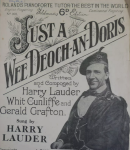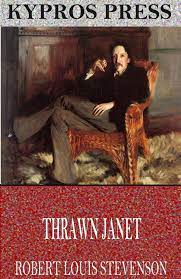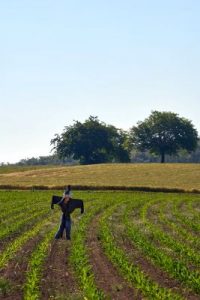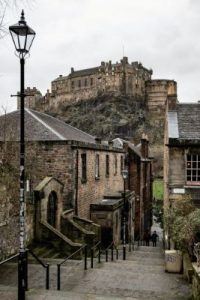
From unsplash.com / © Edward Howell
Yesterday was January 25th and yesterday evening saw a multitude of whisky-and-haggis-fuelled suppers held across the world to honour the 266th birthday of Robert Burns, Scotland’s national poet and one of its most distinguished writers in the Scots language. This is an appropriate time, then, to publish the latest instalment of my list of favourite words and phrases from Scots. I’m getting near the end of the alphabet now – the items in this post begin with letters ‘T’, ‘U’ and ‘V’.
Tablet (n) – a sweet foodstuff peculiar to Scotland, described by one culinary website as ‘crumbly, buttery fudge’. Actually, I remember tablet being hard rather than crumbly. At the end of its cooking process, it’d be a big solid slab in a tin, which you then cut up into little blocks. It was also unhealthily laden with sugar, so obviously it became a popular Scottish treat. In fact, in a short story I wrote a couple of years ago, I referred to tablet as ‘that tooth-rotting, Scottish confection of butter, sugar and condensed milk.’
Tackety boots (n) – hobnailed boots, the tackety bits being the hobnails.
Tappit hen (n) – originally a hen with a crest, although more recently it’s become the term for a type of pewter tankard or jug, with a lid, and a little knob on the lid. I remember from my youth how the Tappit Hen was also the name of a pub in Aberdeen and, if my memory serves me correctly, it had a little nightclub called ‘Roosters’ upstairs. Ha-ha, Roosters… On top of the Tappit Hen. Get it?
Tapsalteerie (adj) – upside down.
Tattie (n) – a potato. Potatoes are a staple of the Scottish diet – see the ubiquity of the dish mince an’ tatties. If you get work on a farm picking potatoes, you are said to go tattie howkin’. And there’s a savoury snack in Scotland, a wedge of potato flatbread that goes very nicely with a fried breakfast, called a tattie scone.

© Grove Atlantic
Tattiebogle (n) – a scarecrow. In Douglas Stuart’s novel Young Mungo (2022), set in Glasgow in the early 1990s, Tattiebogle is the nickname that the title character, 15-year-old Mungo Hamilton, and his sister Jodie give their mother whenever she’s on one of her (frequent) alcoholic benders. That’s when she seemingly transforms into a deranged, subhuman horror.
Tawse (n) – also known as ‘the belt’, a tawse was a strip of leather that had a sadistically forked tail and was an instrument of corporal punishment in Scottish schools. Misbehaving pupils would be brought to the front of the classroom, made to stand with one hand outstretched and the other hand supporting it under the wrist, and given ‘six of the belt’, i.e., half-a-dozen whacks from the tawse across the palm. Thanks to a judgement against its use by the European Court of Human Rights, the tawse disappeared from Scottish schools in the early-to-mid-1980s – making folk my age the last schoolkids to have been terrorised by it.
Teem (v) – to pour (with rain). I’ve seen this included in lists of Scots words but I’ve only ever heard it used in Northern Ireland, where a lot of those words ended up. “Ach, it’s teemin’!” my mum, who hailed from near Enniskillen, would exclaim when the heavens opened and rain started pounding us.
Teuchter (n) – a derogatory word used by Lowland Scots towards a person from the Highlands and Islands (often one who speaks the Scottish Gaelic language). In Robin Jenkins’ 1979 novel Fergus Lamont, the title character describes the word as “the most contemptuous name a Lowlander can call a Highlander: it implies, among other things, heathery ears and sheep-like wits.” I’ve also heard Aberdonians use teuchter in reference to anybody from the surrounding countryside of North East Scotland.

From ebay.co.uk / © B. Feldman & Co
The day / the morra / the nicht (adv) – today, tomorrow and tonight. The nicht is immortalised in the saying It’s a braw moonlicht nicht the nicht (‘It’s a beautiful moonlit night tonight’), which comes from a song called Wee Deoch and Doris by the popular Scottish music-hall performer Sir Harry Lauder. The song includes the lines: “There’s a wee wifie waitin’ in a wee but an’ ben / If you can say, ‘It’s a braw bricht moonlicht nicht’ / Then ye’re a’richt, ye ken.”
Thirled (adj) – being bound to something, by law, by contract, by loyalty or by habit. John Buchan’s novel Witch Wood (1927), whose action takes place in the 17th-century Scottish Borders, contains the questioning line: “Or were they so thirled to their evil-doing that his appeals were no more than an idle wind?”
Thrapple (n) – the throat or windpipe.
Thrawn (adj) – stubborn, obstinate and bloody-minded, inclined to do the opposite of what everyone urges you to do. However, there’s a macabre short story called Thrawn Janet (1881) by Robert Louis Stevenson, in which the word has a different meaning – ‘twisted’ or ‘deformed’. The title character is described as having “her neck thrawn, and her heid on ae side, like a body that has been hangit…”

© Charles River Editors
Tod (n) – a fox. The Scottish author James Robertson once translated Roald Dahl’s children’s book Fantastic Mr Fox into Scots, where it sported the more Caledonian-friendly title Sleekit Mr Tod.
Trauchle (v) – to walk slowly and wearily.
Trews (n) – tartan trousers, once worn by Scotland’s southern regiments and regarded as a traditional garment of the country’s Lowlands (although in reality, like kilts, trews originated in the Highlands). I’ve heard it said that trews were the prototype for the tartan plus-fours that golfers used to wear.
At modern Scottish gatherings, kilts tend to vastly outnumber trews, although I can think of a couple of famous people who had a liking for this form of Scottish legwear: the late Alex Salmond, First Minister of Scotland from 2007 to 2014, who once got involved in a stushie when he went on an official visit to China, forgot to pack his trews and then bought an emergency pair at the cost of 250 pounds to the Scottish taxpayer; the late and much-loved rugby player, Doddie Weir who, off the rugby field, was rarely photographed not in his trews; RuPaul, host of RuPaul’s Drag Race (2009-present), who wore them the day he got a star on Hollywood Boulevard; and, if yellow trews count, the British children’s cartoon character Rupert Bear.
Tup (n) – a ram. Supposedly this term is used in the north of England too, but I’ve only ever heard it used in Scotland.

From unsplash.com / © Wolfgang Hasselmann
Turnshie (n) – a turnip. Somewhat less common than neep, the other Scots word for turnip, turnshie has nonetheless spawned a couple of memorable compound nouns. A turnshie-gowk is another Scots word for a scarecrow, while turnshie-heid is a term of abuse meaning ‘turnip-head’, i.e., a glaikit Liz Truss-style idiot.
Unco (adv) – very. Robert Burns used this word in the following lines from his epic poem Tam O’Shanter (1791) to show the extreme happiness felt by Scotsmen whilst drinking alcohol: “While we sit bousin, at the nappy / And gettin fou and unco happy…”
Uisge beatha (n) – the Scottish Gaelic word for ‘whisky’, this has been commandeered by Scotland’s non-Gaelic speakers as an admiring term for their nation’s famous firewater. Uisge beatha is sometimes spelt in Anglicised form as usquebaugh and it gets its poetic force from the fact that it means ‘water of life’.
Vennel (n) – an alleyway or narrow lane, the word being derived from the French one ‘venelle’. Scottish terms with similar meanings include wynd and close. Probably the most famous vennel in Scotland is one simply called ‘The Vennel’, which threads upwards from the southwestern end of the Grassmarket in Edinburgh and, at its highest point, provides a good vantage point for viewing and photographing Edinburgh Castle.

From unsplash.com / © Ross Findlay




